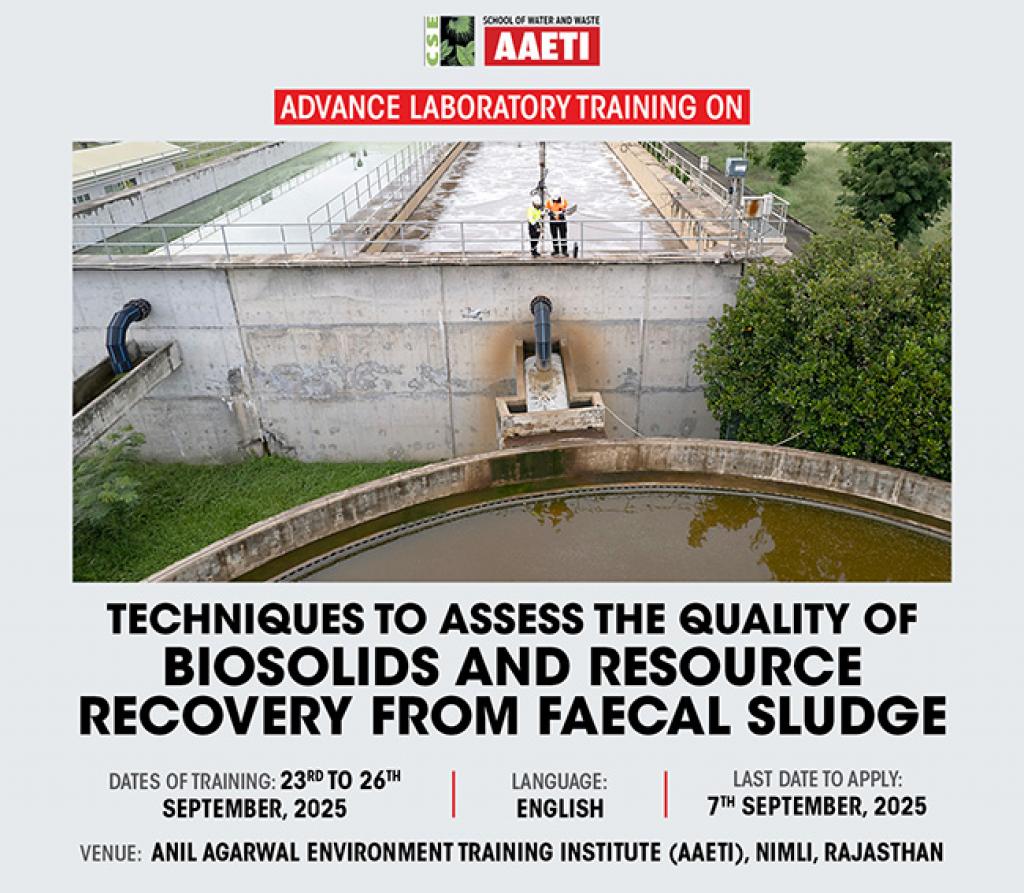Advance Laboratory Training on Techniques to Assess the Quality of Biosolids And resource Recovery from Faecal Sludge
About the training
Faecal Sludge Management (FSM) is an evolving field with continual development and improvement happening in research methodologies. The research on resource recovery from faecal sludge is actively taking place worldwide. Resource recovery from faecal sludge can take many forms, including as a fuel, soil amendment, compost, building material, protein, animal fodder, and water for irrigation.This course focuses on some of the recent advances in laboratory analysis ofphyisco-chemical and biological parameters of co-compost, bio-char and dry faecal sludge. This training is part of the Centre for Science and Environment and Bill Melinda Gates Foundation collaboration on FSM in India. In-house experts and lab scientists from CSE’s Environment Monitoring Laboratory (EML) will guide participants through the sessions and help them learn lab analysis using state-of-the-art equipment and methods. The hands-on approach for the program means that participants get to perform the lab experiments on their own and can enhance their skills while working on some of the best equipment and protocols in their class. The training will be held in CSE’s residential campus in Nimli, near Alwar, Rajasthan.
What you will learn:
- Fecal sludge management and fecal sludge treatment approaches and technologies
- Sample collection, storage and transportation
- Resource recovery from fecal sludge
- Safety measures to be taken during handling of FS based Biosolids
- Analytical skill on the qualityparameters of Biosolids
- Laboratory skills on the sophisticated instruments
- Analytical equipment calibration and methodology validation.
- Good laboratory practices
Methodology:
Highly interactive hands-on training:
- Interactive input presentations
- Analysis of physico-chemical parameters
- Microbial (Faecal coliform, coli and Salmonella) analysis of Biosolidsby CFU/MPN methods
- Helminth eggs enumeration in Biosolidsby AmBic/ZnSO4 method
- Analytical equipment calibration (pH meter, Micropipette, Glassware’s, Centrifuge, Balance, ICP-OES etc.) and methodology validation.
- Heavy metal analysis of Biosoildsusing ICP-OES
- Quality analysis of Biosolidsusing CHNS analyser (Carbon: Nitrogen ratio)
- NPK analysis of Biosolids (CHN analyser and ICP-OES)
- Calorific value estimation of dry faecal sludge by bomb calorimeter
- Hands on experiments and analytical equipment’s; ICP-OES, CHNS, Bomb calorimeter, pH meter.
- Individual and Group Assignments
Who can apply:
- Working professionals in the WASH /FSM/Waste Management Sector
- University/College researchers/ professors /scientistsworking in the area of wastewater or FSM
- Managers or technicians in the Govt. and Pvt. Water/wastewater/FS testing laboratory
Registration Details Click here
|
Course Coordinator |
|
|
Mr. Arvind Singh Senger |
Dr. Rajarshi Banerjee |
| Flyer | |
 |
|
| Download Flyer | |
| Course Date | |
| September 23-26, 2025 | |
| Last Date to Apply | |
| September 17, 2025 | |
| Benefits | |
|
|
| Course fee and facilities | |
| Eligible candidates will be provided with a scholarship for this training by CSE. This support will also cover the cost of stay, including all meals. | |
| Transportation | |
|
|
| Anil Agarwal Environment Training Institute | |
 |
|
| Download here | Download here |
| Route Map for AAETI, Neemli, Rajasthan | |
| Weather in Nimli, Tijara, Rajasthan | |
Share this article